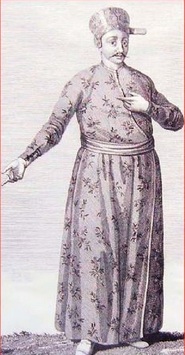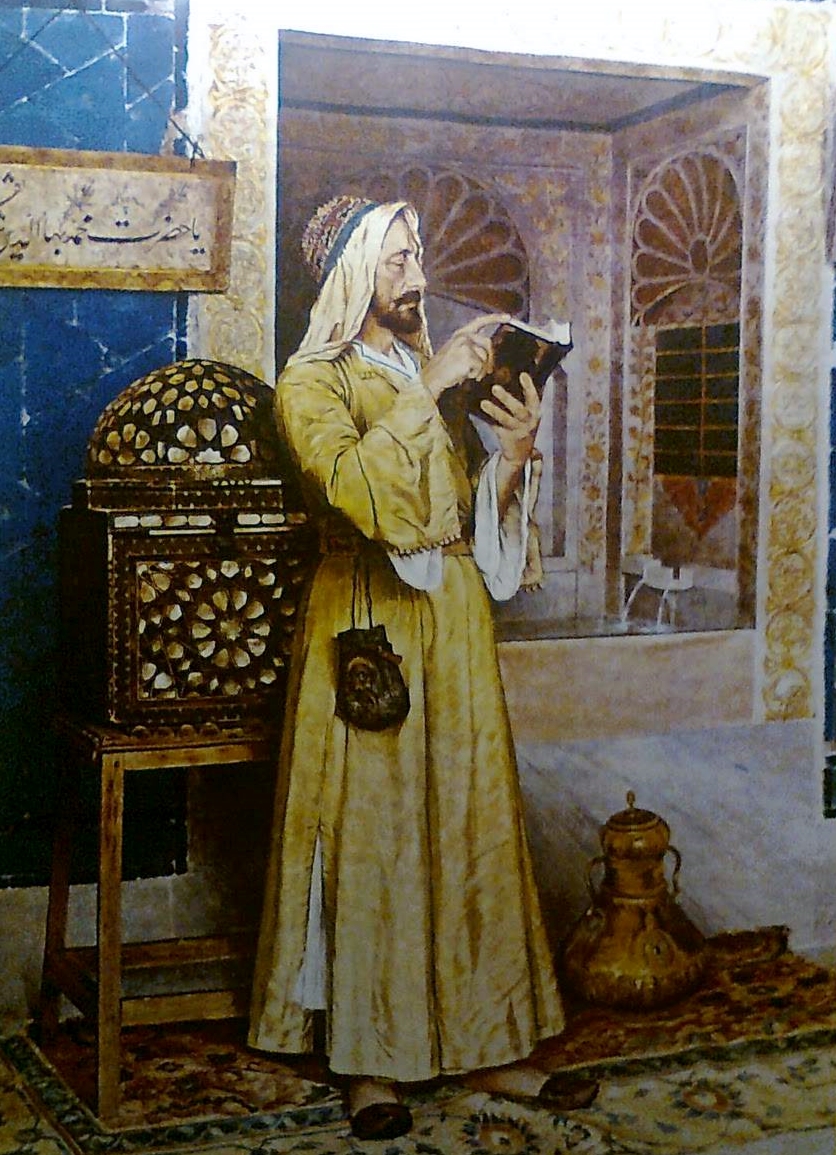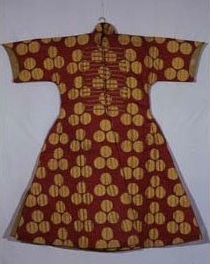
OUR TRADITION OF THE ENTARI (JALLABIA ) HAS YIELDED TO TIME
Our generation is one where fathers wore entaris (jallabias) at least in their childhood, and themselves when they were circumcised. Was there anyone who didn't wear a broken white entari made of flannel in winter, and cotton or muslin in summer? If the weather was cool, a cardigan would be worn over it, and a fez outside, a cap in bed. Here is a comfortable, airy men's sleepwear...

In the Other Entari
In Turkish jallabia is written as "entari" and in Arabic, it is written as anteri with the ayn letter. Anter means fly. So entari means fly-trap. In Persian, however, ender means inside. So enderi means inner garment. Who knows? Today, Arabs duly embrace their jallabias and enjoy them. They wear them especially in official meetings. Each Arab country has a different style of jallabia, indicating where the person is from.
Until 1829, the entaris was the daily attire for men in cities and villages alike. Over their inner underwear, they wore shalwar (baggy trousers), and over that, an entari. These entaris were splendid and could be ornate when necessary. The hems reached down to the ankles. They usually buttoned in the front; to prevent the hems from swaying, the ends on both sides could be tucked into the belt when needed. In addition to cotton and flannel, there were also striped and patterned ones made of various fabrics. One wouldn't just wander around in an entari; a kaftan would be worn over it. Think of today's shirt worn over trousers as the entari and a long coat as the kaftan.
Some made the hem of their night entari a bit shorter. For example, SultaentariAbdulhamid II shortened the hems of his entaris after tripping on his entaris hem during a fire in the palace. As the poet said: "Those who go slowly reach their intended destination; those who rush, trip over their hems." This poem by Enderuni Vasıf also confirms that entaris had pockets:
Where, oh moon, the night before last, near Yeniköy (Neohori),
There were two beauties in a boat, behind us.
On that occasion, I spoke to you, it was the right time,
I had written those words, they remained in the other entari.
Was your promise a kiss or a meeting, I forgot what it was?
[It seems that when changing entaris, it is necessary not to neglect emptying the pockets.]

Society of Entari Friends
During the clothing reform of Sultan Mahmud II, officials were ordered to wear frock coats and trousers. The entari gradually withdrew from official life. But everyone continued to wear it at home, while sleeping, and even when going out. After coming home from work, those meticulous clerks, gentlemen, and pashas would all wrap themselves in their entaris and relax. After dinner, they would go to the mosque and then to the coffeehouse in their entaris, with a fez or cap on their heads, and slippers on their feet; they would sit with one foot up on the chair, showing they were fully at ease. Was it only in the evenings to the coffeehouse? There were many who ran to the grocer with a vinegar bottle, had meat minced at the butcher, visited friends; even those who followed up on matters at government offices.
This freedom (or, some would say, laxity) continued until the arrival of the Young Turks. In 1909, for the first time, it was forbidden to go out in an entari in Üsküdar. Those who did not listen were fined. Some were happy with the ban, some were very angry. Some also saw it as an infringement on personal freedom. Newspapers criticized the government. Satirical magazines caricatured the event. Once, in Bursa, known for having the grave of Karagöz and Hacivat built, the Istanbul Municipality's legal affairs director, lawyer Rami Bey, founded the Society of Entari Friends.
When Rami Bey founded this society, he stood against the 1909 Entari Ban Law. But he claimed the ban was only for Üsküdar, Istanbul. At that time, Herriot, first the mayor of Lyon and later the Prime Minister of France, was also a great lover of the entari. He traveled between Paris and Lyon in a sleeper car, wearing his entari and nightcap. When Herriot came to Türkiye, Rami Bey presented him with a very soft, elegant entari made of Damascus silk. He also made him a member of this society.

Atatürk's Entari
Despite the entari being banned, entari lovers did not stop wearing it at home. Journalist Hikmet Feridun Es described a meeting of ministers and deputies at Çınar Hotel in Yalova. For three days, the deputies wore their airy entaris, either smoking hookah or playing backgammon. On the fourth day, they took off their entaris and wore tailcoats because Atatürk was coming. Nevertheless, Atatürk was not averse to wearing an entari. According to the memories of his close ones, he had several entaris.
In those days, not only men but also women wore entaris. However, women's entaris were naturally very different from men's. The most beautiful gift a man could give a woman he loved was fabric for an entari. In one of Enderuni Vasıf's lyrics, it says: "We will find what you want, do not reproach in vain, Let’s see tomorrow what we have. There is no entari fabric you want, What can I do, oh my master, oh my sultan!"
Üsküdar Like an Orphan
One of the entari lovers, Hüseyn Suad Bey, went to visit a friend in Sultantepe, Üsküdar. He woke up in the morning to a tremendous noise in the street. "Hold him! He's escaping! From the right! Catch him!" When he opened the window to see what was happening, he saw two gendarmes and a watchman chasing a tall man in a white entari. This fugitive, under the name Gave-i Zalim (the hero rebelling against oppression), writes the following poem in Kalem magazine:
From thin to thick, the entari,
For sixty years my poor body wore.
When entaris were banned,
My old self disappeared too.
For within the entari passed,
My life, all my youthful love.
This year in mourning are,
My summer clothes, oh my soft garments.
Without an entari, without love, without flowers,
My Üsküdar remained like an orphan.
Even if I die, I would not grieve,
If my tombkeeper wears an entari.
In my grave, my bones would smile,
My tomb would become Entari Baba.
Önceki Yazılar
-
“FASTING WAS MADE OBLIGATORY ALSO UPON THOSE BEFORE YOU”25.02.2026
-
WHAT WAS THE LAW OF THE OTTOMAN EMPIRE?18.02.2026
-
WOMAN IN THE EASTERN WORLD11.02.2026
-
THE OTTOMAN DYNASTY OWES ITS LIFE TO A WOMAN4.02.2026
-
THE WATER OF IMMORTALITY IN THE “LAND OF DARKNESS”28.01.2026
-
THE WORLD LEARNED WHAT FORBEARANCE IS FROM SULTAN MEHMED II21.01.2026
-
THE RUSH FOR GOLD14.01.2026
-
TRACES OF ISLAM IN CONSTANTINOPOLIS7.01.2026
-
WHO CAN FORGIVE THE KILLER?31.12.2025
-
WHEN WAS PROPHET ISA (JESUS) BORN?24.12.2025